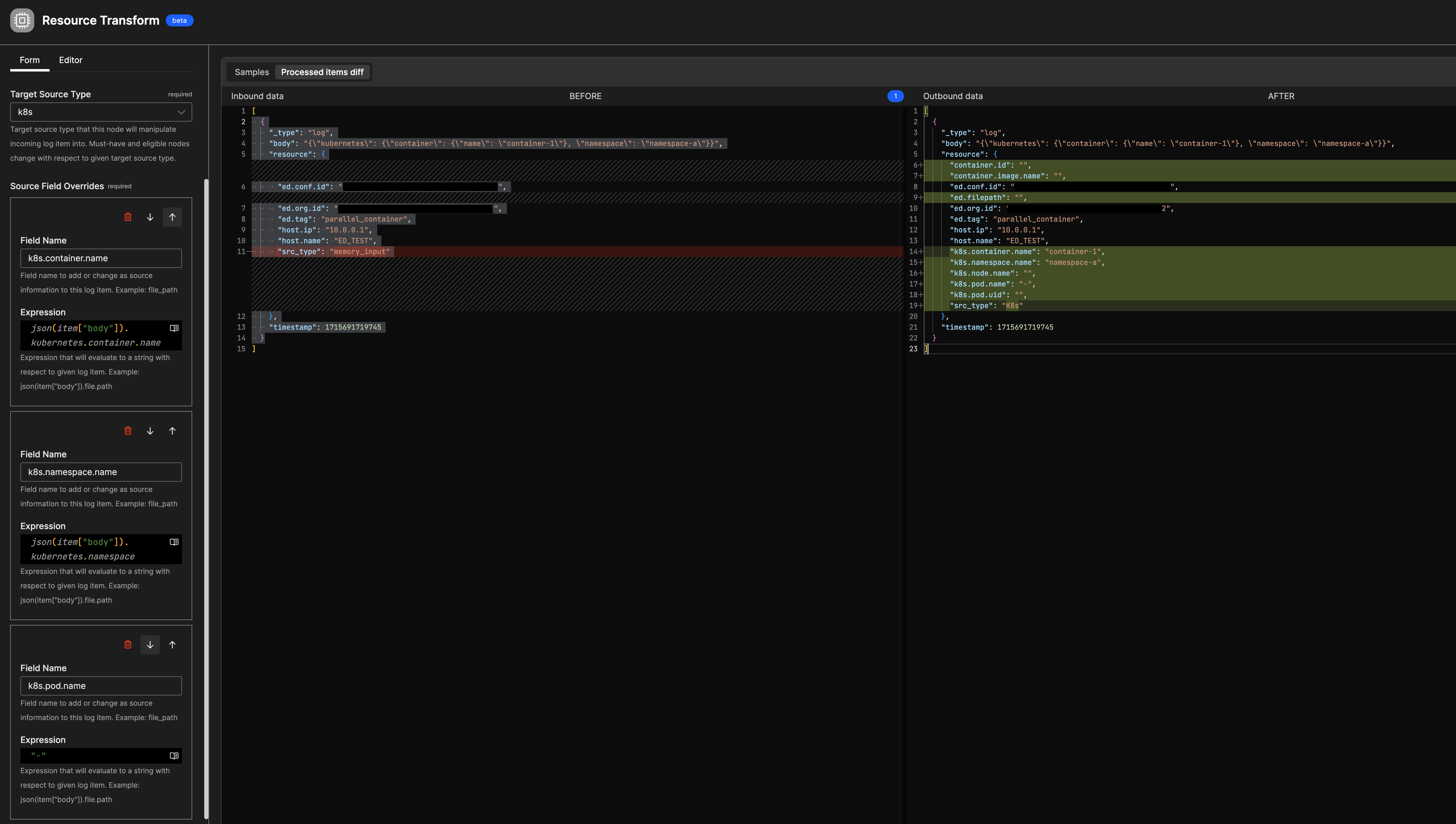Edge Delta Resource Transform Node
3 minute read
Overview
The Resource Transform node changes or adds source information (resources section) of incoming log items. It supports both Common Expression Language (CEL) and Go templates for evaluating expressions.
Each transformation node is designed for enriching different sections of the data item:
| Node | Attribute | Resource | Body | Timestamp | Any Field | Restrictions |
|---|---|---|---|---|---|---|
| Output Transform | Y | Y | Y | Y | Y | Outputs a Custom type data item that cant be ingested by the Edge Delta Archive node. The whole payload is flattened and sent as the event, with all other fields empty. |
| Log Transform | Y | N | N | Y | N | Can only ingest logs, and it outputs only logs. |
| Resource Transform | N | Y | N | N | N | Can only ingest logs, and it outputs only logs. |
| Mask | N | N | Y | N | N | Can only ingest logs, and it outputs only logs. New value can only be a static string. |
The body field is protected from dynamic enrichment until the end of the pipeline (Output Transform) to prevent schema changes from disabling pipeline functionality.
Example Configuration
The following configuration will add three fields to the resources data: k8s.container.name, k8s.namespace.name, and k8s.pod.name. The k8s.container.name and k8s.namespace.name values will be extracted from the JSON body of the log. The k8s.pod.name value will be a static value -.

nodes:
- name: resource_transform
type: resource_transform
source_field_overrides:
- field: k8s.container.name
expression: json(item["body"]).kubernetes.container.name
- field: k8s.namespace.name
expression: json(item["body"]).kubernetes.namespace
- field: k8s.pod.name
expression: '"-"'
Consider the following input log:
{"kubernetes": {"container": {"name": "container-1"}, "namespace": "namespace-a"}}
Suppose it is ingested with the following resource data:
{
"_type": "log",
"body": "{\"kubernetes\": {\"container\": {\"name\": \"container-1\"}, \"namespace\": \"namespace-a\"}}",
"resource": {
"ed.conf.id": "12345678-1x234-4abc-def5-12345678910g",
"ed.org.id": "1098765a-432b-1cde-2345-fg6789hij101",
"ed.tag": "parallel_container",
"host.ip": "10.0.0.1",
"host.name": "ED_TEST",
"src_type": "memory_input"
},
"timestamp": 1715691719745
}
After processing by the Resource Transform node, the data item contains additional k8s resource fields.
{
"_type": "log",
"body": "{\"kubernetes\": {\"container\": {\"name\": \"container-1\"}, \"namespace\": \"namespace-a\"}}",
"resource": {
"container.id": "",
"container.image.name": "",
"ed.conf.id": "12345678-1x234-4abc-def5-12345678910g",
"ed.filepath": "",
"ed.org.id": "1098765a-432b-1cde-2345-fg6789hij101",
"ed.tag": "parallel_container",
"host.ip": "10.0.0.1",
"host.name": "ED_TEST",
"k8s.container.name": "container-1",
"k8s.namespace.name": "namespace-a",
"k8s.node.name": "",
"k8s.pod.name": "-",
"k8s.pod.uid": "",
"src_type": "K8s"
},
"timestamp": 1715691719745
}
Required Parameters
name
A descriptive name for the node. This is the name that will appear in Visual Pipelines and you can reference this node in the yaml using the name. It must be unique across all nodes. It is a yaml list element so it begins with a - and a space followed by the string. It is a required parameter for all nodes.
nodes:
- name: <node name>
type: <node type>
type: resource_transform
The type parameter specifies the type of node being configured. It is specified as a string from a closed list of node types. It is a required parameter.
nodes:
- name: <node name>
type: <node type>
source_field_overrides
The source_field_overrides parameter defines the resource fields and the logic for determining their values. It is specified with two child parameters: field and expression. A source_field_overrides is required.
docker
- container.name, container.image.name (Mandatory)
- container.image.tag (Optional but not defining it can cause loss of information)
ecs:
- aws.ecs.container.arn (Mandatory)
- aws.ecs.cluster.arn, aws.ecs.task.family, aws.ecs.task.revision (Optional but not defining them can cause loss of information)
file:
- ed.filepath (Mandatory)
k8s:
- k8s.namespace.name, k8s.pod.name, k8s.container.name (Mandatory)
- k8s.deployment.name, k8s.statefulset.name, k8s.daemonset.name, k8s.replicaset.name, k8s.job.name, k8s.job.name (Optional but not defining them can cause loss of information)
The expression defines the logic to use to determine the values using a CEL macro or Go template. Alternatively, instead of defining a path, you can use “-” to skip a field to decrease cardinality.
nodes:
- name: <noode name>
type: resource_transform
source_field_overrides:
- field: <field name>
expression: <expression to determine fields value>
- field: <field name>
expression: <expression to determine fields value>